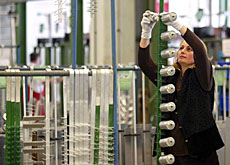Banks keep tight rein on credit for firms

Switzerland’s banks are keeping a tight rein on credit facilities for companies, despite an improvement in the economic outlook.
For the country’s small and medium-sized enterprises (SMEs), securing a credit line for innovative projects has become more difficult.
SMEs constitute 99.7 per cent of all Swiss companies and employ two thirds of the workforce. They were also the beneficiaries of 85 per cent of all loans in April, worth SFr252 billion ($202.2 billion).
Although indicators suggest the economy has started to pick up in the past few months, the banks have reined in credit lines in recent years after being badly burnt in the early 1990s.
According to the Swiss National Bank, total loans to all companies have dropped by SFr4 billion since November 2003, confirming an ongoing trend. In April, the banks had credit lines of SFr301 billion on their books, down 16 per cent since 2000.
While credit lines have gone down for all firms by at least a fifth, companies with fewer than 50 employees have seen theirs cut by 28 per cent.
Bad debt
An increase in bad debts in the late 1990s prompted the Federal Banking Commission to tighten up the requirements needed to secure loans.
“The banks have all standardised their credit procedures,” said Urs Roth, president of the Swiss Bankers Association. “They give much more weight to risk factors.”
The rules are making life more difficult for entrepreneurs who want to set up companies, and small firms.
“They have trouble convincing the banks because their requests aren’t properly prepared or sufficiently backed up,” said Peter Neuhaus, manager of the SME Foundation.
Many SMEs also lack liquid cash, according to Neuhaus. “The economic situation is not very good for SMEs now and any improvement is likely to be hindered by the banks’ credit rules,” he added.
Neuhaus admitted, however, that SMEs with good credit credentials shouldn’t have trouble securing loans. He said banks were continuing to lend money to “good risks”, but were pushing less promising firms off their books.
Shrinking business
The country’s two biggest banks, UBS and Credit Suisse, hand out 45 per cent of loans to companies in Switzerland. Regional and cantonal banks account for the rest.
UBS, which has around 140,000 business customers, says the number of individual firms seeking loans has dropped.
“Over the past five years, our customer base has shrunk,” said spokeswoman Eveline Müller, adding that the reason was because fewer companies were seeking loans rather than because of the bank’s credit policy.
According to Thomas Enz, an economist at Credit Suisse, the smaller number of credit demands can be explained by companies lowering stock levels and delaying investments.
“The amount of credits varies significantly according to the economy’s performance,” he said. “There is however a delay between economic improvement and actual requests.”
Not so bad
Not everybody considers the credit situation bad for SMEs. Rudolf Walser, chief economist at the Swiss Business Federation (economiesuisse), says bankers aren’t keeping a stranglehold on credits, even though some companies may be feeling the pinch.
Thomas Sutter, spokesman for the Swiss Bankers Association, adds that a lowering of credits should not be interpreted as the result of restrictive banking practices.
The number of requests for credit by companies hardly increased during the first quarter of 2004, according to the Swiss National Bank. Companies only wanted SFr211 billion of the available SFr301 billion, while SMEs asked for three-quarters of their SFr252 billion allotment.
swissinfo with agencies
Small and medium-sized companies constitute the backbone of the Swiss economy.
In Switzerland, 99.7 per cent of firms belong to this category of business, which employs between one and 250 people.
Banks supply these companies with 85 per cent of all business loans.

In compliance with the JTI standards
More: SWI swissinfo.ch certified by the Journalism Trust Initiative












You can find an overview of ongoing debates with our journalists here . Please join us!
If you want to start a conversation about a topic raised in this article or want to report factual errors, email us at english@swissinfo.ch.